Atlantic Ocean, Sailing
#2 – Crossing the English Channel
When we bought our sailboat, we knew that we were still far away from our dream to sail around the world. Not only us, but also the boat was not yet ready for a circumnavigation. We decided to spend most of our holidays on Lumos, in order to learn the lines and also to do all the necessary upgrades so we could turn our boat slowly into an off shore sailboat. We also decided to sail south, to Spain or Portugal, just somewhere in warmer climates with less rainy weather.
At the end of March 2018, we flew to Poole, England to experience our first sailing adventure with Lumos. The plan was to cross the English Channel and sail directly to Roscoff, France. There we wanted to rest for a few days and take Lumos across the Bay of Biscay to La Coruna in Spain.
The first few days before departure we practiced mooring in the Cob’s Kay marina and did some sailing on the beautiful Jurassic Coast. When we did the sea trial about 6 month ago, we had already noticed that the autopilot didn’t work properly.
Therefore, the first boat work before crossing the channel was to fix the autopilot. It took us one week to find the faulty parts and to replace them. We were highly excited and also a bit scared when the time came to start our very first big sailing adventure. According to the weather forecast we should have almost no wind and no waves for the whole crossing. As time was running short, we started our trip to Roscoff, France under the engine not knowing that it will be the scariest time of our lives.
Almost everyone told us that the English Channel can be very busy and that it’s better if we would have an AIS transponder or radar on board. We toke the advice serious and bought an AIS transponder before we left Poole, but it was impossible to find a connection adapter which we needed to connect the transponder to the chart plotter. We had no time left to wait for the connector and so we set off without installing the AIS.
We had absolutely no idea how busy the English Channel can really be, until we reached the traffic separation zone in the middle of the night. From the distance we saw a lot of lights on the horizon, it looked like a big city. We checked our position again, just to make sure the many lights were not from one of the channel islands. As it turned out the lights belonged to hundreds of big cargo ships and other gigantic cruise liners.
Carefully we approached the traffic separation zone and realized that those big ships wer probably five time faster than us. We felt like an awkward little snail that has to cross the road. With a queasy feeling we crossed our fingers and dived into that wasps’ nest and hoped for the best.
It was a nightmare, it was pitch black and we could only see the lights of the ships but not the shape of the ships or something that would tell us in which direction they were going and also almost impossible to estimate the distance between them and us.
In the beginning I was able to determine the position and the driving direction of 14 ships around us by using two fixed points on the boat and the lights of the moving ship. I believe the method is called relative bearing. After a while I stoped checking the position because there were too many, we were surrounded by big ships.
Suddenly, a group of lights rose up behind us very fast. I knew this ship must be too close. I tried to understand in which direction it was going but I gave up quickly, it was impossible. In the heat of the moment I had to relay on my gut feeling and without loosing time I pushed the throttle completely down and turned the boat a bit left. Luckily it was the right decision. A couple of seconds later that cargo ship past us very close on starboard side as I saw a high black wall passing us. I also could smell the exhausted of heavy fuel oil. For the first time in my life I could see my knees shacking.
It took us three hours to cross the traffic separation zone, the worst three hours of my life. The hole channel crossing took us 32 hours from Poole, England to Roscoff, France. It was damn cold, and we were freezing all the time.
But we made it and are still super proud of it.
In Roscoff, we had only 10 days of vacation left for the Bay of Biscay. There was no weather window for the next passage, so we had to leave the boat in Roscoff and fly back home.
The Bay of Biscay had to wait until our next holidays.
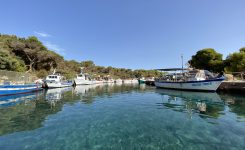
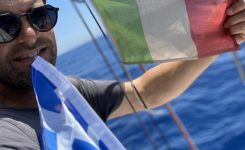
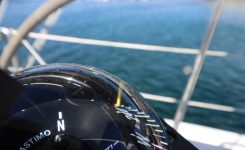
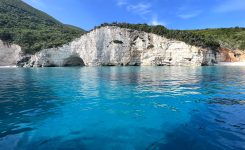
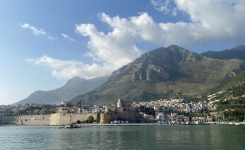
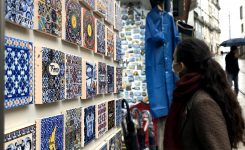
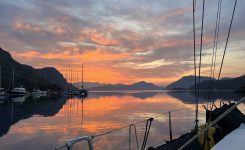
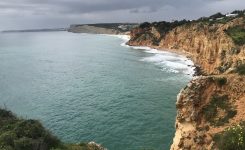
Ein Kommentar
Myriam
Such an adventure…so proud of you two, that you follow your dream.
I wish you all the best, beautiful sunsets, amazing sunrises, good weather conditions, a good gut feeling, unforgettable adventures, lovely people who accompany you and a lot of fun!